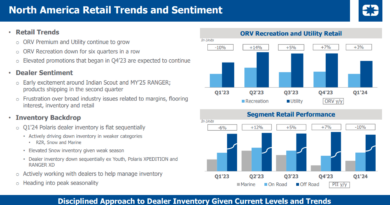Do you have sacred cows in your dealership?
 Some things in dealerships never change. And sometimes neither does our long-term staff. When asked why we do some things the way we do, we scratch our heads and say, “It’s the way we have always done it!”
Some things in dealerships never change. And sometimes neither does our long-term staff. When asked why we do some things the way we do, we scratch our heads and say, “It’s the way we have always done it!”
Humans, like dealerships, are creatures of habit. Long-term employees are common in a lot of dealerships and are often revered for having such long tenure. Dealer principals stand behind them out of loyalty even sometimes to their own demise. Managers and employees learn to tolerate some long-term employees. After all, these employees that have been around forever add value. or they wouldn’t have been kept around so long. right? Or do they detract from value and stifle innovation, progress and profit?
These dealership employees are referred to as proverbial “sacred cows.”
Sacred cows can be seen grazing in many dealerships both large and small. It could be the parts manager that was standing there when the last manager quit or was fired. It could be the dreaded family member who is gone more than at work. Or it could be the employee who has been with the dealership since it was founded back in the day when the Dead Sea was just sick! These employees often spread germs of ill will and sit on the sidelines, criticizing everyone that works for change, improvement, or profit. To the dealership’s demise, all of these scenarios detract from value, impact dealership culture and erode dealership profitably.
The tough business decision here is strong management and implementing and enforcing employee accountability.
Dealer principals and managers must acknowledge that there is no such thing as guaranteed lifetime employment. Dealerships today are deceptively complicated and stressful environments. In the first place, there is the matter of money and other valuable resources at stake. And the second, keeping lackluster sacred cows tells other staff members that it is OK to perform marginally and that being liked by others is more important than being a high performer on the job. Here are some tips to think about when dealing with sacred cows and other underperformers:
- Time to get real. Rather than tolerate these seemingly permanent employees, show ownership how things could improve with their replacement or reallocation of their resources to another area of the dealership.
- Prove your business case. Tell those in command how keeping sacred cows affects the profitability of the dealership. A strong business case has a direct impact on profit and dealership culture.
- Its not me; it’s you. Getting rid of any employee should be a business decision based on how their behavior affects the dealership morale and profits. It has nothing to do with how beloved they are to the technicians out back or how many treats they bring in. It has to do with how they affect productivity, morale and future sales.
Don’t be afraid to tip the cow once in a while. Provide clear business evidence of how the dealership is not moving forward because of how sacred cows operate. The very definition of insanity is doing the same thing over and over again expecting a different result. Thinking that you will achieve higher levels of operating performance while keeping someone who does not contribute to dealership success is akin to “talking out both sides of your neck.” Your employees can easily identify problems with people and processes. They are waiting for you to ask and respond. Leading others is hard work, and sometimes people get their feelings hurt while being managed. It’s OK. It is always better to focus on what is good in your dealership instead of trying to fix something that can never be truly fixed. Put your time and effort into those who can move the dealership to higher levels of performance and profit.
*No cows were hurt during the research for this blog. Only humane research techniques were used such as observation.
Forrest Flinn, MBA, PHR, SMS has been in the motorcycle industry for nearly 20 years and has been a true student and leader serving in various capacities. He previously worked as an implementation consultant for Lightspeed and as a general manager with P&L responsibility for a large metro multi-line dealership. Currently Forrest is the managing partner and chief visionary for a consulting firm that specializes in outsourced accounting, human resources, social media strategy, dealership operations consulting and Lightspeed/EVO training.
Contact: forrest@powersportsmc.com









Many times, I have put off firing an employee because I was afraid that I wouldn’t be able to replace them, or they’d create too big a hole in my organization.
After the problem employee was gone. I didn’t regret it once. Not once.
My $0.02
When the “Sacred Cow” as defined here, rears its head, not just maybe but that IS reflective on the ownership and management of the business and therefore the team. This is somewhat compromising to everyone in the pyramid paradigm and it wouldn’t matter if the pyramid was right side up or my personal favorite, upside down.
When an individual employee reach’s this point of no return as described who’s responsible for them getting there? They’ve obviously been there a good while or we wouldn’t be enjoying this discussion.
Who takes the responsibility that this once happy productive “Cow”, (as these mostly good people often referred to, and instead of saying “they were great last year, what happened to them” and instead say ” They were great last year, what have I not done to keep them inspired?” At what time frame are we thinking a person enters this “Pasture”? Always at 5 years, 8 years, 12 -15 Years? What career work environment are you building/managing?
I have been and am a fan of reallocation of resources to save jobs and give new fresh perspectives and have done it successfully more than once.
But take that “cow” and see that there is that blend of employee that still, loves their job, loves their customers and customers love them. They eat sleep and breathe their job, make tough sacrifices in their life to accommodate their co workers, customers and schedule. Has always received good reviews and not just in general, but overall is a senior employee extraordinaire. Not a “Problem Child” but one real person knowingly dependent on their schedule, their hours, their income to exist and in short make a living. Perhaps a single parent, a struggling student do you even know what struggles they have. This employee has been there these many years, has an intimate knowledge of your organization, your business, your customers and vice versa. Shows up on time, stays late, takes the blame when nobody else will, and is productive in every definition.
Is it acceptable to target these individuals with tactics that make them saddened you’d treat them in such a disrespectful manner? That they’re no longer thrilled to be there due to not a specific change in policy but an emotional change in their work environment. A change in the way they’re treated or thought of. They are human, they’ve been neglected and relationships strained maybe due to management changes, team changes or double standards, (yes they exist), favoritism and deceit. Out and out jealousy by managers or other employees. That to have wages cut, hours downsized made them feel unnecessary or made to feel unwanted feel that your “Done” with them, or worse, . . just plain hurt them.
Now that we beat them, downtrodden them, run new hires over the top of them, removed their privileges, cut their benefits, that one not a dealers fault in most cases but nevertheless, have been shown with new policies they’re not trusted anymore. Usually because somebody earlier stole something or abused a privilege and now instead of just punishing the guilty, they’re all guilty. I’d ask any dealer that I’d consult with, “Can you put yourself in their shoes?”. . really?. . no I mean really.
Do you really know what’s going on in your business and with your employees or do you care? Do you delegate, knowingly or unknowingly, these ever so important tasks and findings to a subordinate that possibly doesn’t care but for one?
Are we going to reach a point that we agree that’s its just easier to fire your mistakes than it is to fix them?
Famous quotes from famous people are proven to inspire so, here’s a couple out of hundreds:
“The growth and development of people is the highest calling of leadership.” ~ Harvey Firestone
“ The Secret of My Success is a Two Word Answer: Know People” ~ Harvey Firestone
Thanks for listening
20 Year Industry Rep.
35 years Business Administration & Management * Distribution
Traveling Road Rep * Motorcycle Industry Advocate* Motorsports Enthusiast
Ex Off Road Racer * Dad * Grandfather * Brother * Son * Husband * Trailrider